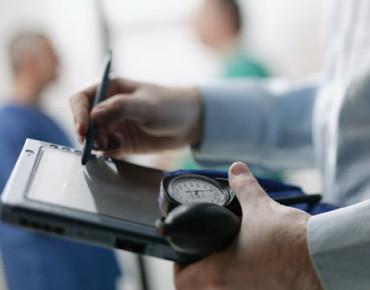NSF Mines Medical Records for Patient Care

Heng Huang, a computer scientist at UT Arlington, has been tasked with leading a National Science Foundation (NSF) project to mine medical records data to personalize patient care and predict issues that could lead to readmission.
The project is called “Robust Large-Scale Electronic Medical Record Data Mining Framework to Conduct Risk Stratification for Personalized Invention,” has granted Huang $461,098 as a part of a $892,587 collaborative project with UT Southwestern Medical Center and Southern Methodist University.
Huang says that the work should help to find common ground between hospitals’ drive to improve patient care and insurance companies’ need to lower the costs of hospital visits.
“If collecting and deciphering this data can give doctors better information so they can give patients better healthcare, it will make a big difference,” Huang says. “We especially want to predict possible readmission dates for heart failure patients because timing is extremely important to them. It can be the difference between life and death.”
The larger effort fits into more than $200 million contribution from six federal departments and agencies toward the National Big Data Research and Development Initiative, which was announced last year by the Obama Administration. The initiative seeks to address challenges and opportunities that massive data sets pose across industries, but UT Arlington’s College of Engineering Dean Khosrow Behbehani pointed to Huang’s work as a leading project within health informatics research.
“Big data is becoming more and more a part of our lives. This research would help us and our physicians make important healthcare decisions,” Behbehani says. “Dr. Huang’s work makes use of the increasingly large amounts of data being generated in the healthcare community and will use it to develop systems that help us live healthier, longer lives.”
Beyond Huang’s immediate focus, however, Behbehani expects the work to benefit additional areas such as climate prediction, manufacturing safety and cybersecurity in addition to the results they should offer physicians.
To kick off his research, Huang is currently working with the University of Indiana, Purdue University and the University of Pennsylvania on electronic medical record mining to measure the effects drugs have on patient physiology.










